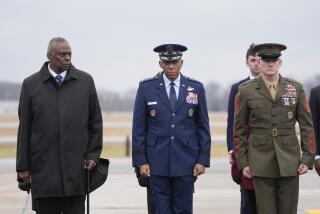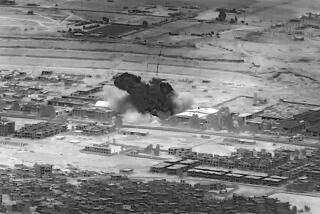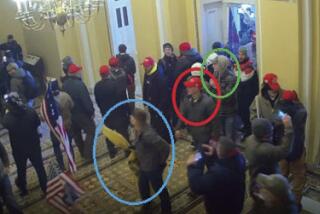6 Marines Slain by Bombs in Western Iraq Offensive
BAGHDAD — Six U.S. Marines were killed by roadside bombs in Iraq during heavy fighting west of Baghdad, the military said Friday.
The deaths occurred as U.S. forces wrapped up one of two operations against insurgents in western Al Anbar province ahead of next week’s national referendum on Iraq’s draft constitution.
Four of the Marines, assigned to Regimental Combat Team 8, 2nd Marine Division, 2nd Marine Expeditionary Force, were killed Thursday near Karmah, about 50 miles west of the Iraqi capital. The other two, assigned to the 2nd Division’s Regimental Combat Team 2, also were killed Thursday, near the town of Qaim, close to the Syrian border.
In the last week, more than 3,500 U.S. and Iraqi troops took part in the two operations, Iron Fist and River Gate, along the Euphrates. The U.S. military said Friday that at least 50 suspected insurgents were killed during the six-day Iron Fist offensive, which concluded Thursday. A death toll was not given for River Gate.
The two offensives were intended to crush logistical support for insurgents who, American commanders believe, are coming into Iraq across its porous border with Syria.
The military has officially ended the Iron Fist portion of the operation, which involved about 1,000 U.S. Marines, soldiers and sailors, but has established new outposts in Sadah, just a few miles from the Syrian border, to control an area that has long been a trouble spot for American troops.
Some residents of Al Anbar province, however, charged that the military attacks were politically motivated and would only encourage more Iraqis to join the guerrillas.
“This is all tied up with the timing of the referendum,” said Sheik Usama Jadaan, a tribal leader in the city of Karabilah near Qaim.
American military operations “will hinder the political process rather than facilitate it,” he said in a telephone interview. “How can we have a referendum in one week?”
Sunni Muslim Arab leader Saleh Mutlak, who is negotiating last-minute Sunni demands for constitutional amendments, urged insurgents and Americans to observe a cease-fire during the Islamic holy month of Ramadan, which began this week.
“We should not fight during Ramadan,” Mutlak said, adding that he has called on other leaders to participate in a conference that he hoped would open a dialogue between insurgents and Americans. “We are approaching the referendum and elections. All this needs a peaceful climate to work.”
Jadaan said the fighting in the west was so brutal that residents “are now seeing members of their families being killed in front of their own eyes by the American bombardment.”
“Obviously, they’ll seek revenge, and this is what’s happening,” he added.
The allegations of civilian deaths could not be verified. Lt. Col. Steve Boylan, a U.S. military spokesman, said he had no reports of civilian casualties in the offensives.
“All of our operations are conducted knowing we have civilians in the area,” he said. “We minimize damage as much as possible, and that includes civilians.”
American forces cordoned off the town of Haditha, about 130 miles northwest of Baghdad, and bombed several bridges along the river, according to witnesses.
“The health situation is bad in the city because the Americans applied a curfew,” Ayad Ghazi, acting director of Haditha Hospital, said by telephone.
The sick and injured have been unable to reach the hospital, and some women have given birth at home, he said.
Khaled Hussein, head of the Haditha City Council, feared that the military operations could prevent people from voting on the constitution. “The city now is paralyzed,” he said.
According to U.S. forces, troops discovered numerous artillery rounds converted into bombs on the grounds of a Haditha mosque. Marines, along with U.S. and Iraqi soldiers, found weapons caches in Haditha and the western town of Haqlaniya that held 40 mortar and artillery rounds, two complete mortar systems, small arms and thousands of rounds of ammunition.
A controlled detonation of a roadside bomb led to blackouts in Haqlaniya and Bani Dahir.
American commanders have warned of increasing violence before voters go to the polls Oct. 15 to approve or reject the country’s draft constitution.
“In spite of all the killing, the rockets, the suicide attackers, the beheadings, we will go and vote yes for the constitution,” Shiite Muslim cleric Jalaluddin Saghir told worshipers during Friday prayers at Baghdad’s Bratha Mosque.
“If we will not have the constitution, we will have nothing.”
Times staff writers Saif Rasheed and Caesar Ahmed in Baghdad, special correspondent Zaydan Khalaf in Samarra and a special correspondent in Fallouja contributed to this report.
More to Read
Sign up for Essential California
The most important California stories and recommendations in your inbox every morning.
You may occasionally receive promotional content from the Los Angeles Times.










